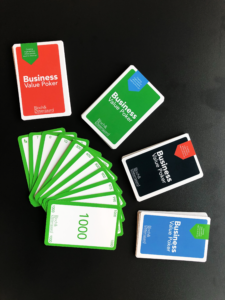Can a Game of Poker be a Conversation Creator?
By Arbresh Useini, 21. October 2019
Something that truly can evoke people’s curiosity when they visit our office is the numbers that are written on the post-it’ on our strategy whiteboard. The post-it with the lowest number has 10 written on it, and the highest has the number 1000. This is the value we in collaboration have assigned to that specific strategic initiative.
Every six months at our strategy meetings we write strategic initiatives on post-its, discuss them and then assign a business value them. We use Business Value Poker for this.
A game of Business Value Poker contains five sets of 11 cards each, with numbers ranging from 0 to 1000, a question mark and a trash can.
The game has several origins and designs and was introduced to us by Ugilic – kudos to them!
The picture shows a set Business Value Poker in our layout. We have designed our own version, which we use when working with our customers. The cards are one of our most important tools, when we value strategic activities.
Playing business-oriented card games (in this case Business Value Poker) has many benefits for organizations:
- It’s a great way to start a conversation that sometimes can be difficult, and
- to set a framework and create an equality between employee and leader.
Let’s dive into what the benefits of playing Business Value Poker are and when to play the game.
It encourages you to have conversations
Often, we think about bold leadership as risk taking, but another aspect to bold leadership is to ask difficult questions that lead to fruitful conversations. In general, using business-oriented card games in business settings are great conversation starters, and can lead to questions and statements, which wouldn’t be said otherwise. Leaders that dare to be different and bold, also dare to look each other in the eyes and talk about, who they are, what they want to do, and what they think.
They commit
Engaging in these kinds of conversations through card games is a lever for commitment. This obliges you as the leader to ask why your employee has chosen that specific card, and why they assign the activity that specific value. When both parties are open and candid with their dialogue, a mutual agreement and commitment is faster to obtain.
A shared language and framework arise
Playing Business Value Poker (or any kind of business-oriented card game) gives you a shared language: You only have those specific cards at hand to refer to, and a shared framework arises. The game provides a framework, as you have a finite selection of words or numbers to select from. This makes the conversation easier. When you play, a calibration of standpoints and approaches emerges, as you get a mutual understanding of importance and value creation.
And, after you’ve played the game, you have that shared language to refer to in business situations: next time you think something really can add value to the organization, you can refer to the cards and say “that is 1000 to me” – or similar.
Equality emerges, as no one is the boss
When playing Business Value Poker (or any other business-oriented card games), equality emerges between employees and leaders, as all participants reveal their choice at the same time. This means that everyone will have an opinion that matters.
This matches with the ideologies of e.g. Sociocracy and similar designs of democratic organizations, where everyone’s equally important and should to be heard.
How to get going?
Try to integrate Business Value Poker as a regular part of your rhythm and daily life, at strategy sessions, at weekly coordination meetings or similar. Use the cards in a small group first, with 4-5 people – until you get more comfortable with it.
If you want to scale the tool to the entire organization, try using them in different sizes of groups, whether you’re 15 or 300. If you’re playing the game in a plenum, you can easily make a simulation of a card game on a software e.g. an app and show a few cases on a big screen as conversation starters. By letting a big group play the game via a screen, you create a common understanding and experience, and thereby creating a common emotional memory.
Get free, useful tips and tools
that will help you navigate the future
and enhance your leadership already today
Do you need input on how to get started?
Take a look at at our categorized toolbox here
– it’s all free
Do you want to make a deep dive?
Visit our learning paths with the
newest content – it’s all free!






